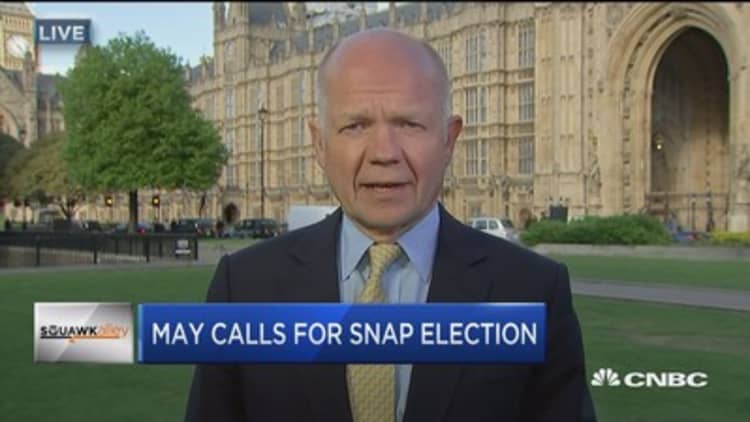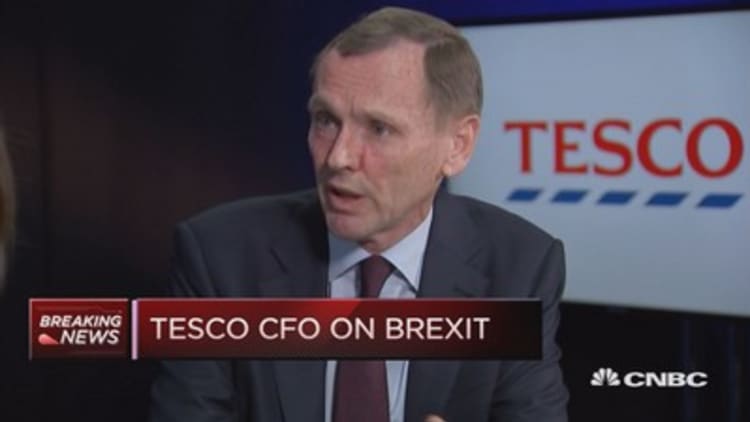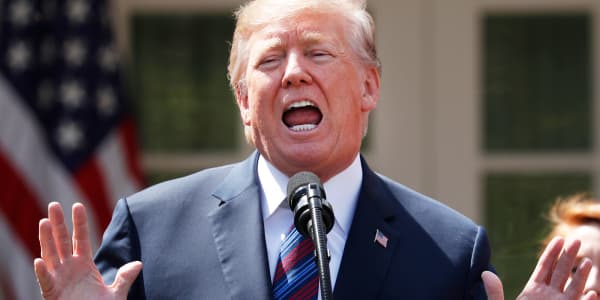Brexit will damage the U.K.'s political and economic influence, with fresh trade deals likely to prove difficult to negotiate, former British Prime Minister John Major and leader of the Conservative party from 1990-1997, said on Thursday.
"The U.K. has a robust political and economic structure. And so I do not share the view of those who anticipate an economic catastrophe upon leaving," Major said at the Credit Suisse Global Megatrends conference in Singapore on Thursday. "What I do fear is that the U.K. will be less influential politically and will do less well economically than if she had remained in the European Union."
Major, who was a key figure in the negotiation of the Maastricht treaty, which, when signed in 1991, formed the European Union, said he expected the economic downsides of Brexit will come in "slow time," rather than being immediately felt.
"I don't for example expect lots of banks to up and move from the City of London, but I do think when it comes to considering fresh investment, there may be more fresh investment in the European Union, and maybe a little less in the U.K."
He was also critical of elevated expectations that trade negotiations would proceed quickly.
"Those who favor Brexit, anti-Europeans, promise an easy deal because they say the 27 other European Union members export more to the U.K. than the U.K. does to them. But that crude statistic masks a significant reality," he said. "While the U.K. exports nearly half of their goods to Europe, the average exports of the other 27 European nations to the U.K. are a mere 8 percent of their exports. There is no doubt which side most urgently needs a deal."
He admonished policymakers to be realistic about the time scale and complexity of negotiations, noting that his country has not only forfeited access to the single market and customs union, but also bilateral trade deals negotiated by the European Union, for members of the bloc, with 53 other nations.
"Once we leave, we lose those bilateral deals," he said. "Can we, 65 million Britons, get the same deal as 500 million Europeans negotiated for Europe, including the U.K.?"
Major also expressed concern that Brexit would cost the European Union influence, especially as it is set against the other global superpowers, China and the U.S.
"A united Europe matters as a political force in a way that individual European nations never again will do," he said.

He also expressed concerns about potential victims of Brexit-inspired economic upheaval.
"The biggest losers from a complete disengagement between Britain and Europe are going to be those least able to protect themselves, both in Europe and in the U.K.," he said.
Since the U.K.'s June referendum to exit the European Union, the path toward Brexit has been far from smooth.
The pound has dropped from as high as $1.50 just before the vote to exit the European Union to as low as $1.1979. On Thursday, it was trading around $1.2805 against the dollar.
That's already begun to spur higher inflation in a country dependent on food imports and analysts expected that would pinch consumer spending.
The government was also expected to need to boost spending to take over regulatory functions currently handled by the EU. As the U.K. already has a current account deficit, that could send borrowing costs higher.
Some companies have already begun to move operations out of the U.K. and into other EU countries to maintain access to the single market and its policies on freedom of movement and immigration and tariff-less trade.

Algebris Investments recently estimated that the U.K. economy could contract by 7.5 percent of gross domestic product (GDP) over the next seven to eight years in the aftermath of Brexit, or the equivalent of 300 million pounds ($376.92 million) a week over the period for a total of around 175 billion pounds.
This week, Prime Minister Theresa May said she was "reluctantly" announcing a snap general election, blaming divisions within parliament over Brexit as the impetus behind the abrupt reversal of her position that there would be no election before 2020.
Current polling figures indicate the Conservative party should emerge with a much stronger majority in June's general election and some commentators have observed that May's push toward a so-called "hard Brexit" will proceed with more legitimacy and most likely less political friction.
In the U.K.'s "Article 50" letter to the European Union on March 29, which officially began the exit from the bloc, May repeatedly emphasized the U.K.'s wish to pursue a "deep and special partnership" with the EU, however, in acknowledging that a failure to agree a deal would mean a reversion to World Trade Organization trade terms, May's continued stance regarding her preference for "no deal" over a "bad deal" was clear.
—CNBC's Gemma Acton contributed to this article.





